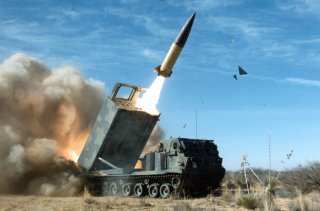Operation Dragonfly: Ukraine Is Using ATACMS to Pummel Russia
The introduction of the ATACMS on the battlefield promises more spectacular results.
After months of asking and nudging the United States, Ukraine has received MGM-140 Army Tactical Missile Systems, or ATACMS, after being promised the weapons during Ukrainian President Zelensky’s visit to Washington DC in September.
Without waiting long after the White House’s approval to give the munitions, Kyiv introduced the ATACMS to the war in an impressive way.
Overnight, the Ukrainians targeted and destroyed two Russian tactical airfields, in what they dubbed Operation Dragonfly, inflicting heavy casualties on the Russian Air Force and further shifting the scales of power towards Kyiv’s side.
OPERATION DRAGONFLY: THE ATACMS IS HERE
At around 0300 AM, Ukrainian special operations forces used ATACMS munitions to attack the Russian tactical airfields in Berdyansk and Luhansk in Russian-occupied Ukraine.
According to the Ukrainian Ministry of Defense, the ATACMS munitions destroyed nine attack and transport helicopters, one air defense system, several special vehicles for supporting air and air-defense operations, and ammunition depots. In addition, the attack damaged the airfields’ airstrip. These are the worst losses the Russian Air Force has ever suffered in a single day.
Situated next to the Sea of Azov, the Berdyansk airfield is about 70 miles south of the frontlines, while the Luhansk airfield is inland and about 60 miles from the frontlines.
Evidence from the ground, including remains of an MGM-140 ATACMS missile and half-destroyed M74 bomblets that can go in ATACMS missiles, corroborates that the Ukrainians used their newest weapon to attack the two airfields.
Missile debris and unexploded ammunition from Berdyansk airfield.
Ukrainian President Volodymyr Zelensky initially sent a cryptic message in the wake of the targeted strike.
“I thank some of our partners. That is indeed an effective weapon, as we agreed,” the Ukrainian president stated in the wake of Operation Dragonfly on Telegram.
Then, a few hours later, Zelensky confirmed reports about the ATACMS.
“Our agreements with President Biden are being implemented. They are performed very accurately – “ATACMS” have proven themselves,” Zelensky said.
ATACMS being launched against the Russian airfield.
The attack on the Berdyansk and Luhansk tactical airfields is the first instance of ATACMS use on the battlefield in Ukraine.
The Pentagon’s delivery of ATACMS to Ukraine opens the way for other NATO members to contribute similar munitions. Most notably, Germany could now be encouraged to send Taurus cruise missiles to Kyiv. (The United Kingdom was the first to send long-range precision munitions in the form of Storm Shadow cruise missiles, with France following soon thereafter with SCALP-EG cruise missiles.)
Kyiv has repeatedly stated that precision-guided long-range munitions are essential to its war strategy.
Interestingly, the Ukrainian military congratulated its special operations forces for the attack, suggesting that it has given use of ATACMS to its special operators, likely in an attempt to ensure that the few munitions Ukraine has achieve the maximum benefit.
WEAPONS THAT RUSSIA CAN’T MATCH
The aftermath of the ATACMS strike in Berdyansk airfield.
The Russian military has no effective countermeasures for the MGM-140 ATACMS.
According to U.S. officials, the Pentagon sent Ukraine expired MGM-140 ATACMS Block 1 (M39) munitions, which have a range of up to about 100 miles.
With a weight of about 3,700 pounds, the Block 1 version of the ATACMS munitions can carry a warhead of up to 1,250 pounds that packs around 1,000 M74 bomblets the size of baseballs that can destroy anything in their path. Essentially a highly accurate cluster munition, Block 1 missiles are ideal for taking out troop concentrations in the field or in a base or destroying large numbers of weapon systems.
When it comes to delivery method, the ATACMS can be fired by the M142 High Mobility Artillery Rocket System (HIMARS) or the M270 Multiple Launch Rocket System (MLRS) by just changing the missile pods.
The Ukrainian forces have already used the M142 HIMARS and M270 MLRS to great effect in the war, inflicting extremely heavy losses on the Russians and destroying scores of bases and logistical nodes.
The introduction of the ATACMS on the battlefield promises more spectacular results.
Stavros Atlamazoglou is a seasoned defense journalist specializing in special operations and national security. He is a Hellenic Army veteran (national service with the 575th Marine Battalion and Army HQ). He holds a BA from the Johns Hopkins University, an MA from the Johns Hopkins’ School of Advanced International Studies (SAIS), and is pursuing a J.D. at Boston College Law School.
This article was first published by Sandboxx News.
Image: Shutterstock.

